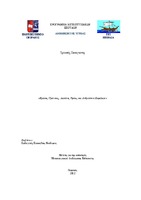Κράτος Πρόνοιας, Δαπάνες Υγείας και Ανθρώπινο Κεφάλαιο. = Welfare State, Health Expenditures and Human Capital.

View/
Subject
Welfare state ; Human capital ; Δαπάνες, Δημόσιες ; Οικονομικά της υγείας ; Κράτος πρόνοιαςAbstract
It is an undeniable fact that due to the operation of the welfare state and the crisis that it passes over the past few years, health expenditures have increased worldwide. Studies have shown that increase in health care expenditure is related to the income level and economic growth of a country. But a theoretically optimal level of health expense and an optimal growth rate are rarely investigated. This paper assumes that health expenditure is a gross investment in human capital and follows the usual characteristics of investment in the Solow growth model. Based on Solow, a theoretical model is developed to discuss the role of health capital in economic growth. The model shows that convergence is present between poorer and wealthier countries when both physical and health capitals are considered. In the empirical analyses, this paper first estimates the optimal steady state product level based on the method of Mankiw, Romer and Weil (1992). Secondly, the optimal steady state health expenditure amounts are projected assuming that the steady state situation automatically achieves the Golden Rule consumption maximization result driven by the free market force. The results show that most of the studied 15 OECD countries have excessive health expenditure for approximately the past two decades. Some of the countries show a decreasing pattern of overspending and finally reach the optimal level. But a few of them do not show a format of cost containment for controlling health expenditure

